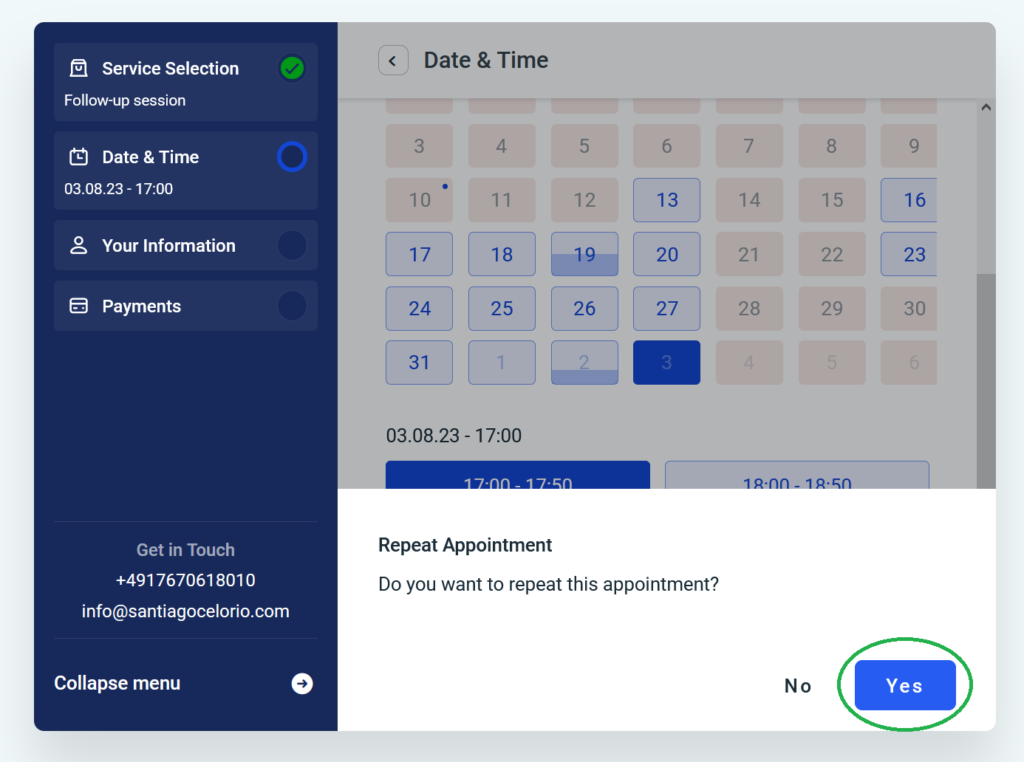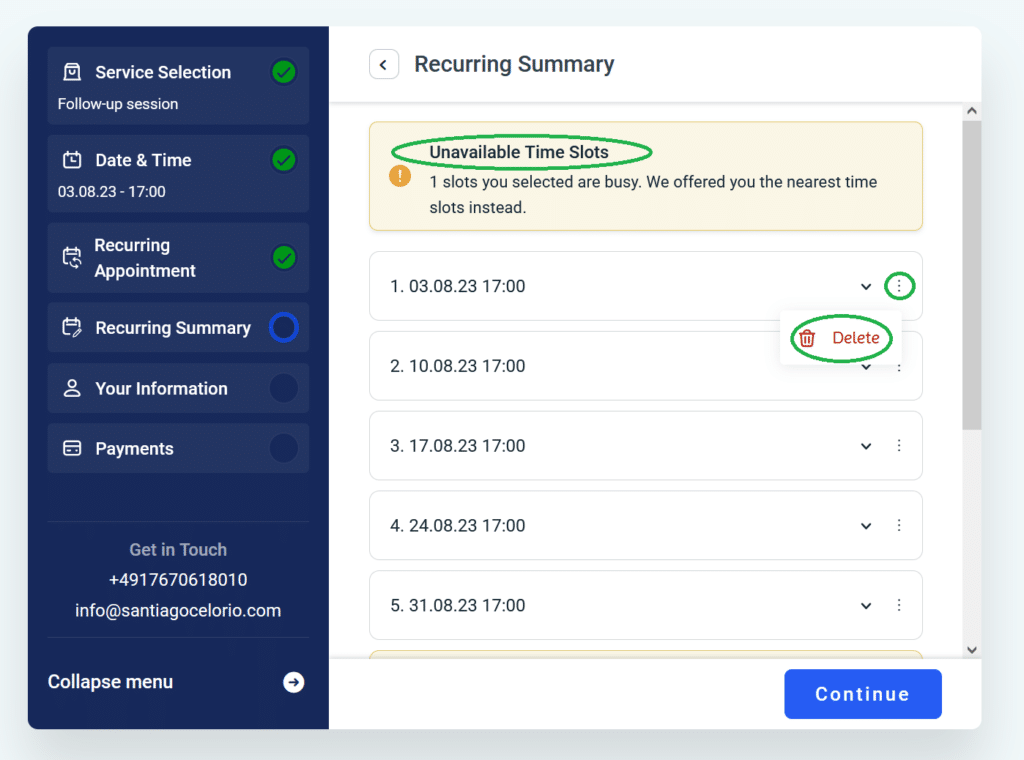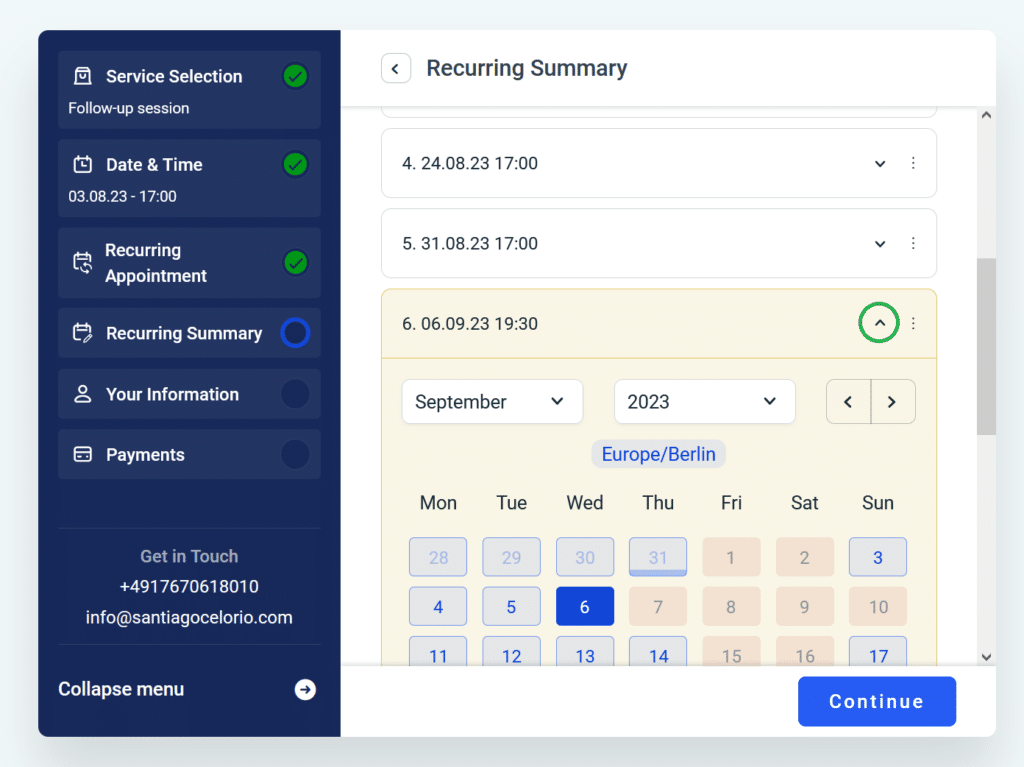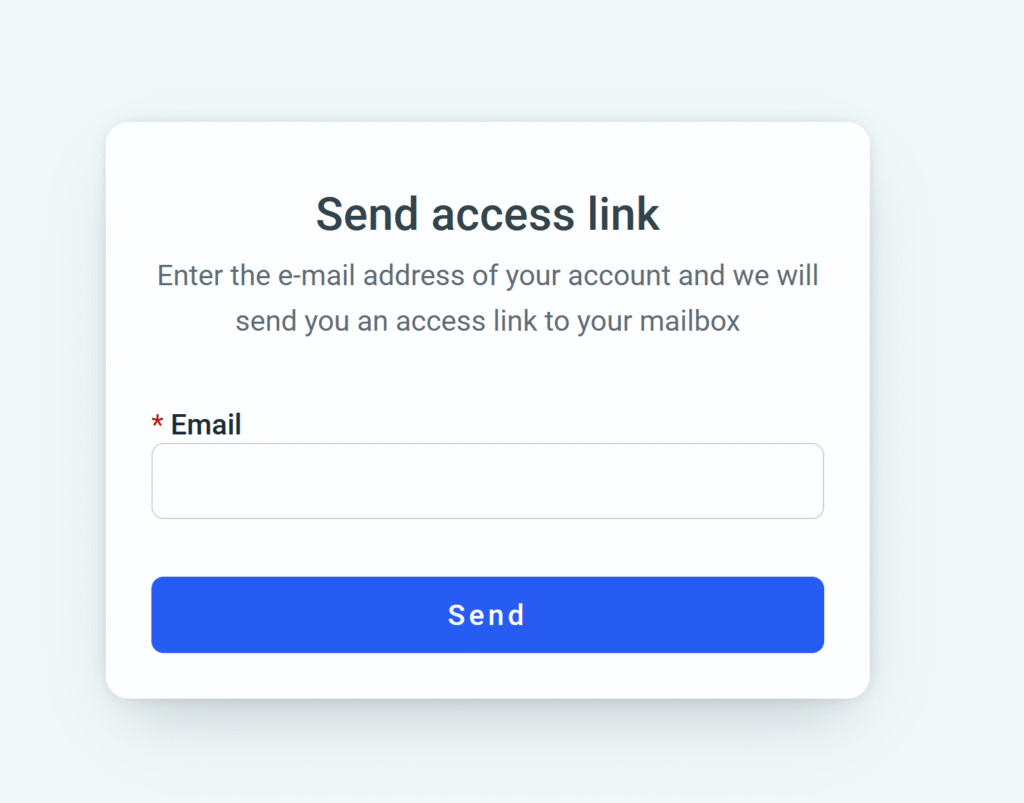Booking
How do I book recurring sessions?
*Recurring sessions are only possible for follow-up sessions
After you have selected the date of an appointment, you can click on “Yes” to repeat an appointment

Then you can choose the regularity of the appointments by selecting the weeks between each appointment (e.g. 1 week for a weekly appointment, 2 weeks for an appointment every 2 weeks; 4 weeks for a monthly appointment). Then select a day on which the appointments should take place (e.g. Mon, Tue or Sun). Select only one day if you want to have only one appointment per week (or every fortnight). Finally, enter the number of total appointments. I usually recommend booking blocks of eight sessions.

If some dates are not available, alternative dates are displayed (highlighted in yellow)

You can either delete or adjust appointments before you continue

All appointments are calculated as a total sum. But don’t worry. You can conveniently pay for the appointments individually, although you will receive a total invoice.

To do this, select “Pay by invoice” at the checkout and complete your order. You will receive an invoice at the end of the month, but you can pay in instalments (one session at a time)

I do not find suitable appointments
Please try to book an online appointment as a temporary solution instead until your requested appointment becomes available again. If this is not an option for you, feel free to contact me to find a mutual solution.
If you are time constrained, or want to keep a specific time for appointments with me, I recommend booking all appointments with advance notice. I usually work with blocks of eight appointments. As a result, you are welcome to reserve the entire block in advance so that your dates are safe with me. For this I recommend the “purchase on account” so that you do not have to pay all dates at the same time, but one after the other.
You can of course reschedule or cancel your reserved appointments at any time with 48 hrs notice conveniently on my website.
How can I access my client profile?
- You will receive the access link for your profile in an email after each booking. Please click on the “client profile” link in your email:

- If you cannot find your e-mail with the link, you can have a link sent to you in the login area.

- You will receive an email with a link to do this.

- If you have problems or do not receive the emails, please contact me.
I’m an international client (outside of Germany), what should I consider?
If you live outside Germany, I can offer you online coaching sessions. A psychotherapeutic process is not possible, on acount of interjurisdictional reasons. This means, we can focus on your general well-being and on bringing clarity to your life, but not on psychological disorders or diagnoses.
How can I cancel or reschedule appointments?
To do this you need access your client profile. If you do not know how to do this, or have forgotten your access details, please read “How can I access my client profile?” in the FAQ
- Inside your panel click on the three points next to the appointment you would like to change
- Choose the action you want to perform (cancel or reschedule)

- To change the appointment, choose the time you want to change it to.

- If you would like to cancel the appointment click on “cancel” and confirm your choice

Payment
When will I receive the invoice for your services?
If you wish to pay for a session by invoice, you can select “Pay by invoice” as your payment method. You will first receive a confirmation email with my bank details. You can pay for the appointment from that moment or up to 14 days after receiving the invoice. I will usually send you the invoice at the end of our treatment or counseling plan. You can also request monthly invoices if you wish.
If you have already paid with other payment methods (e.g. Paypal, Klarna, credit card), you will also receive an invoice at the end of the treatment or counseling as proof of my services.
How can I get my insurace to pay for therapy?
First of all, it is important to distinguish between therapy and counselling. If you have a psychological diagnosis or get one from me (according to ICD-10), it is clearly a therapy. If you do not suffer from a psychological disorder, it is counselling. Counselling is not a medical service and is therefore not covered by health insurance. The same applies to couple therapy (even if one of the partners suffers from a disorder).
Currently, my therapy is only paid for by private insurance or supplementary insurance. To begin the process of reimbursement, please check with your insurance company about their terms (often linked to how they bill) before you begin therapy with me. After you have received the necessary information, please feel free to contact me so that I can accommodate your insurance company’s requirements.
Therapy or counseling
How do I know if you are the right therapist for me/us?
There are many factors that contribute to a good relationship between therapist and client.
Ask yourself these questions: Do I feel understood? Does the therapist seem competent? Do I feel better or relieved after seeing my therapist? Can I imagine myself growing or progressing during therapy?
If you answer “yes” to most of these questions, chances are you have chemistry with your therapist. Try also to express your concerns, needs and expectations directly. This will give your therapist important information for his or her work.
How does online therapy work?
I use Zoom for online sessions. Zoom offers a safe end-to-end encrypted mode for video calls. When you book an online appointment you will automatically receive an email with a personalized link for our session.
Please enter the video call room a couple of minutes before our appointment to assure that you are ready for our video call. Remember to check your internet connection, webcamera and microphone before our appointment. If you cannot find the email with the link, remeber to check your spam folder.
If you can’t find the link or email, you can also log in to the video call via your client profile.
To do this, select the arrow on the far right of the desired appointment. Then click on the link below your appointment.

How regularly should I get therapy?
This varies depending on the case. If you suffer from a psychological disorder, weekly appointments are recommended, possibly every 2 weeks. Regularity is important to ensure progress monitoring and therapy success. I therefore advise against stopping therapy without having found another treatment alternative.
However, if we start with a counselling process (i.e. without a psychological disorder), I would normally suggest starting with weekly sessions to achieve our goals. However, depending on your specific situation, more sessions per week or one session every fortnight may be more appropriate. For some specific cases, single counselling sessions or monthly sessions may be helpful, but it depends on the situation. A change in the frequency of counselling is of course possible at any time during the course, if desired or necessary.
I want therapy but my partner(s) doesn’t. What can I do?
A basic ethical principle for therapy is free will. If your partner does not want to take therapy, the best is not to pressure him/her to do it. You might, however, invite him/her kindly to take two initial sessions to give it a chance and discuss his/her concerns or doubts regarding therapy during the sessions.
You can contribute a lot for him/her to feel safe and not overwhelmed about the idea of therapy. You should, however, never force them or reproach them strongly for not wanting to. Taking therapy is a good resource for many people, but it is not the only solution for solving a problem.
I’m looking for therapy for a friend or family member, what should I do?
Trying to support a friend or loved one is very understandable. While it might be tempting to undertake the responsibility and book therapy sessions for them on their behalf, this might be counterproductive for both parts. The best you can do is be supportive, validate their situation and invite them kindly to look for help. If they agree to this, you can suggest a therapist you find fitting. However, the affected person should establish contact and show motivation to attend therapy.
What if I don’t have any problems?
My counseling is focused on promoting well-being. This is why you don’t need to feel bad or have any problems to get counseling. We can focus in improving your quality of life and satisfaction with yourself and your surroundings. In couples therapy, we could work, for example, towards creating deeper bonds or preparing for important life projects.
